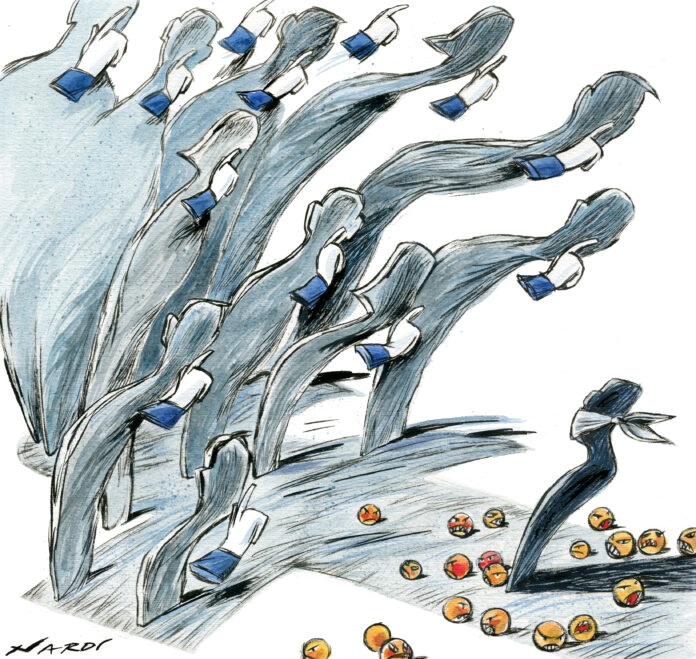(THIS ARTICLE IS MACHINE TRANSLATED by Google from Norwegian)
One should not be very observant to acknowledge that we are living in a time of upheaval with increasing tension and disturbingly weak global political leadership. While many liberal democracies are struggling, Norwegian politicians praise the strength of ours, characterized by high confidence. It may then be worth reflecting on the fact that what perhaps characterizes Norway the most is that we live in a money-lubricated democracy, which dampens potentially explosive contradictions between wings, center and periphery as well as between generations. Rich enough, in part at the expense of others, to displace the fundamental challenges. Evasive enough to celebrate the small victories, but push tough decisions and priorities onto future generations.
In operational professions, and from voluntary efforts in disasters og crises, we know that different alternatives and encouragement of counter-perceptions is the key to good decisions and high execution ability. Those who are to live with the decisions and solve the task must own the solutions.
Until quite a few years ago, it was practically and technologically difficult to give everyone the opportunity to participate directly in ongoing legislative and executive politikk. We had to choose someone to represent us and trust their judgment. Today technology and platforms allow you and I to participate in legislative and executive political work in a far more active and direct way. The fact is that we, to a much lesser extent, need elected politicians to represent our opinions, but we still continue as before.
The interesting question then becomes why? Why do we not seize the new opportunities for participation and engagement? Is it because politicians protect their position and their profession? Because they do not trust their voters, and believe that we must be protected from ourselves? I do not know, but from my point of view it is obvious that we need to renew our democracy in the face of increasing risk and great challenges.
Estonia, Ireland, Iceland, Taiwan
A majority of the world's countries are democratically governed. Most are representative democracies, indirectly such in that we choose who will pass laws and exercise power on our behalf. Modern democracies have a varying element of direct democracy with referendums – Norway has had five national referendums.
Among the different countries that have seen this are Estonia, Ireland, Iceland and Taiwan. Since 2013, Estonia has used a combination of popular assemblies and crowdsourcing in a similar way that gave Wikipedia its hallmark of quality: https://rahvakogu.ee/in-english/. Randomly assembled assemblies combined with online crowdsourcing. The process led to several proposals that were passed as law, but above all to great commitment and strengthened democracy. http://www.kogu.ee/wp-content/uploads/2013/01/Peoples-assembly_summary-by-Praxis_2014.pdf. President Ilves himself concluded that the mechanism was not an alternative decision-making body to Parliament. It was a complementary opportunity for an emerging democracy that sought opportunities to ensure that the concepts of "participation" and "engagement" had real meaning.
What perhaps distinguishes Norway the most is that we live in a money-smear
democracy.
Iceland and Ireland are democracies with a good base and tradition for consensus-based decisions. Iceland's way out of the financial crisis and Ireland's work on new abortion legislation are examples of consultation and engagement, through randomly assembled parliaments in combination with open crowdsourcing (https://www.citizens.is), creates good results even in complicated and difficult cases. The experiences have been discussed in detail in several articles that put these into a framework of necessary constitutional changes, and point out that the context has a lot to say for successful results. https://lawdigitalcommons.bc.edu/cgi/viewcontent.cgi?referer=http://scholar.google.no/&httpsredir=1&article=1748&context=iclr.
Taiwan is another type of fairly young democracy that has used crowdsourcing (www.pol.is) in work on laws on both online alcohol sales and Uber. https://www.technologyreview.com/2018/08/21/240284/the-simple-but-ingenious-system-taiwan-uses-to-crowdsource-its-laws/ . An exciting aspect is that those who participate in the crowdsourcing, can not comment on each other's posts, just express support or not. The disposition removes the trolling, while the visual models that eventually appear in maps and clusters, propel new proposals that ultimately result in a constructive consensus that all parties have ownership of.
Today's almost overwhelming amount of news and fake news, combined with click-driven media, polarizes debates and creates fronts. It is naive to believe that such instability cannot affect us – through external events or internal contradictions. Identity politics has fertile ground here too. Our democracy is currently stable and solid. So stable that it is boring and unengaging especially among young voters. So solid that that is exactly why we should lead the way in the development of revitalization and renewal. Perhaps Estonia, Ireland, Iceland and Taiwan can inspire us to increase our commitment and participation.






